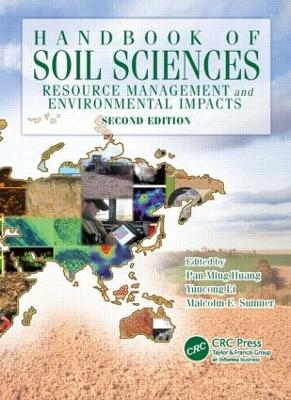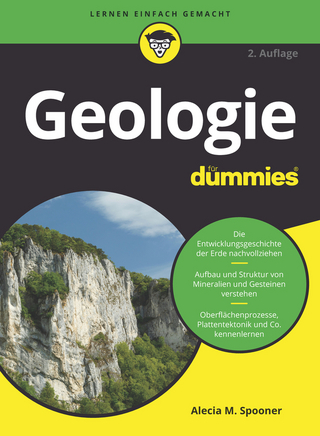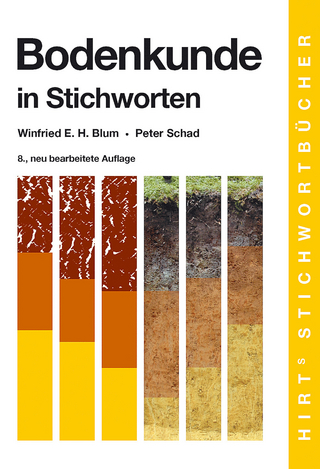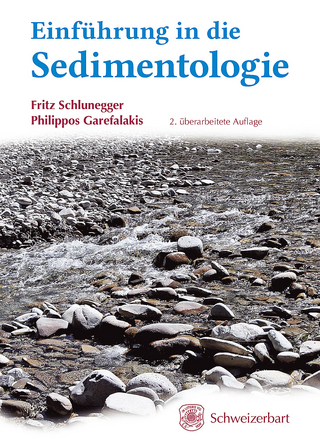
Handbook of Soil Sciences
Crc Press Inc (Verlag)
978-1-4398-0307-3 (ISBN)
Handbook of Soil Sciences: Resource Management and Environmental Impacts, Second Edition is the second of two volumes that form a comprehensive reference on the discipline of soil science. Completely revised and updated to reflect the current state of knowledge, this volume covers interfacial interactions between the physical, chemical, and biological regimes within the soil; the factors that control the availability of plant nutrients and microelements; interdisciplinary aspects of soil science, including salinity, sodicity, and soil erosion; and soil databases for assessing worldwide soil resources.
Critical elements addressed in each section include:
Descriptions of concepts and theories
Definitions, approaches, methodologies, and procedures
Data in tabular and figure format
Extensive references
This cohesive handbook provides a thorough understanding of soil science principles and practices based on a rigorous, complete, and up-to-date treatment of the subject matter compiled by leading scientists. It is a resource rich in data, offering professional soil scientists, agronomists, engineers, ecologists, biologists, naturalists, and students their first point of entry into a particular aspect of the soil sciences.
Dr. Pan Ming Huang was the professor of soil science emeritus at the University of Saskatchewan, Saskatoon, Saskatchewan, Canada, and served for 44 years in that institution. His research work has significantly advanced the frontiers of knowledge on the formation chemistry, nature, and surface reactivity of mineral colloids, organic matter, and organomineral complexes in soils and sediments and their role in the dynamics, transformations, and fate of nutrients, toxic metals, and xenobiotics in terrestrial and aquatic environments. His research findings, embodied in well over 300 refereed scientific publications, are fundamental to the development of sound strategies for managing land and water resources in the Earth’s critical zone. Dr. Yuncong Li is the University of Florida Research Foundation (UFRF) professor of soil science in the Department of Soil and Water Science at the Tropical Research and Education Center, Institute of Food and Agricultural Sciences (IFAS), University of Florida in Homestead. He is also an affiliated professor at the University of Florida’s Center for Tropical Agriculture, Hydrologic Sciences Academic Cluster, School of Natural Resources and Environment, and Water Institute. His research and extension program focuses on water and soil quality monitoring, assessment and remediation, management practices to improve nutrient use efficiency, and nutrient cycling in soils/sediments. He has authored or coauthored over 150 research papers, 70 extension articles, and 15 book chapters. He recently edited a book, Water Quality Concepts, Sampling, and Analyses (CRC Press, 2010). He serves as an associate editor for Critical Reviews in Environmental Science and Technology and Communications in Soil Science and Plant Analysis. Dr. Malcolm E. Sumner is the Regents’ Professor of Environmental Soil Science Emeritus in the Department of Crop and Soil Sciences at the University of Georgia, Athens. His published works cover a wide range of topics, including subsoil acidity, the agricultural uses of gypsum, diagnosis of yield-limiting factors, beneficial use of anthropogenic wastes, and transport of nutrients in soils. A widely respected author, Dr. Sumner’s works include Soil Acidity (Springer-Verlag, 1991), Soil Crusting: Chemical and Physical Processes (Lewis Publishers, 1992), Suelos de la Agroindustria Cafetalera de Guatemala (University of Georgia, 1994), Distribution, Properties and Management of Australian Sodic Soils (CSIRO Publications, 1995), Sodic Soils: Distribution, Properties, Management, and Environmental Consequences (Oxford University Press, 1998), and the Handbook of Soil Sciences (CRC Press, 1999). He has authored or coauthored over 350 scientific papers, including 220 refereed journal articles, and has contributed chapters to over 30 books.
Soil Physical, Chemical, and Biological Interfacial Interactions. Soil Fertility and Plant Nutrition. Interdisciplinary Aspects of Soil Science. Soil Databases. Index.
| Erscheint lt. Verlag | 16.12.2011 |
|---|---|
| Reihe/Serie | Handbook of Soil Science |
| Zusatzinfo | 92 Tables, black and white; 12 Illustrations, color; 260 Illustrations, black and white |
| Verlagsort | Bosa Roca |
| Sprache | englisch |
| Maße | 210 x 280 mm |
| Gewicht | 2018 g |
| Themenwelt | Naturwissenschaften ► Geowissenschaften ► Geologie |
| Naturwissenschaften ► Physik / Astronomie ► Angewandte Physik | |
| Weitere Fachgebiete ► Land- / Forstwirtschaft / Fischerei | |
| ISBN-10 | 1-4398-0307-2 / 1439803072 |
| ISBN-13 | 978-1-4398-0307-3 / 9781439803073 |
| Zustand | Neuware |
| Haben Sie eine Frage zum Produkt? |
aus dem Bereich


